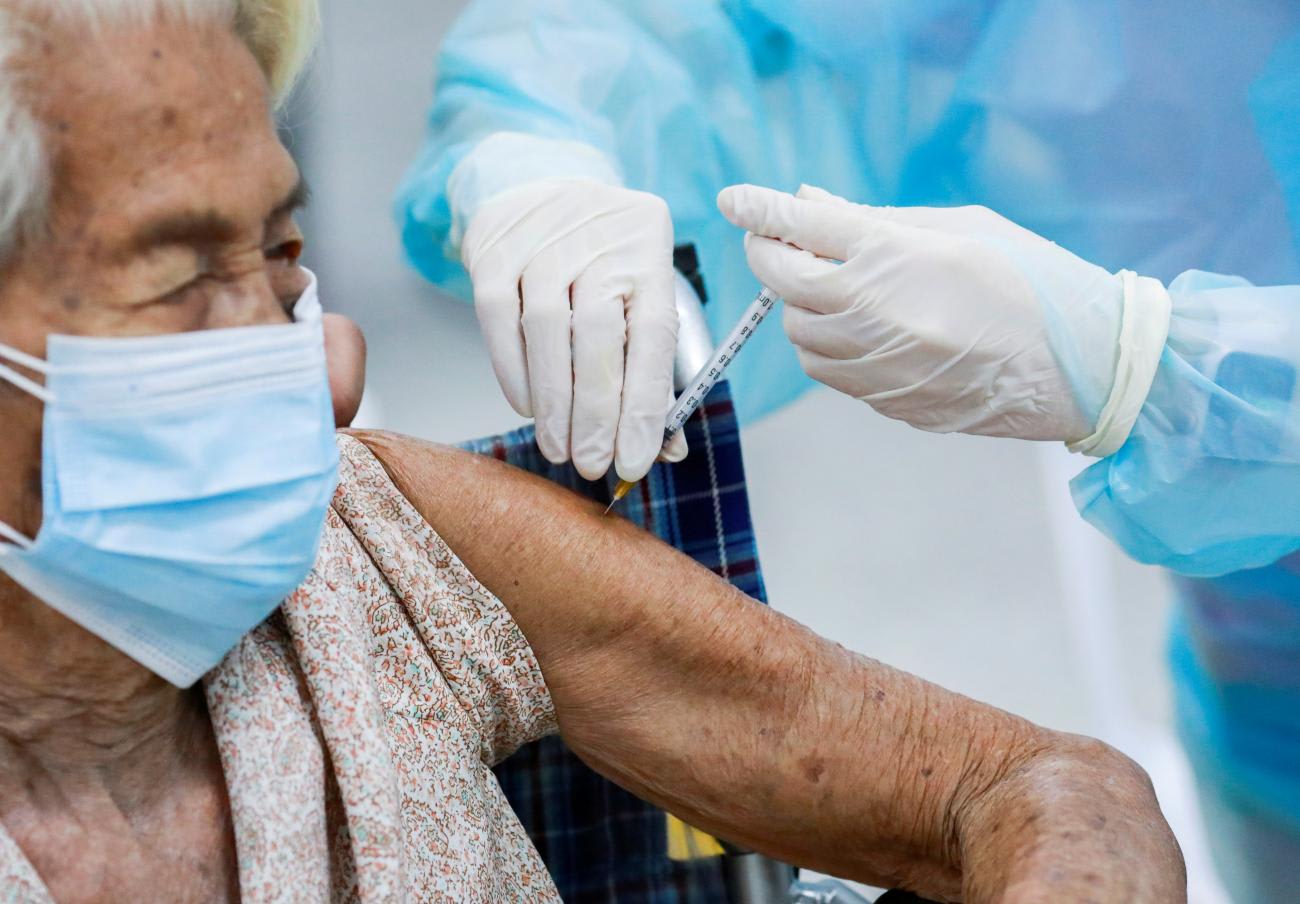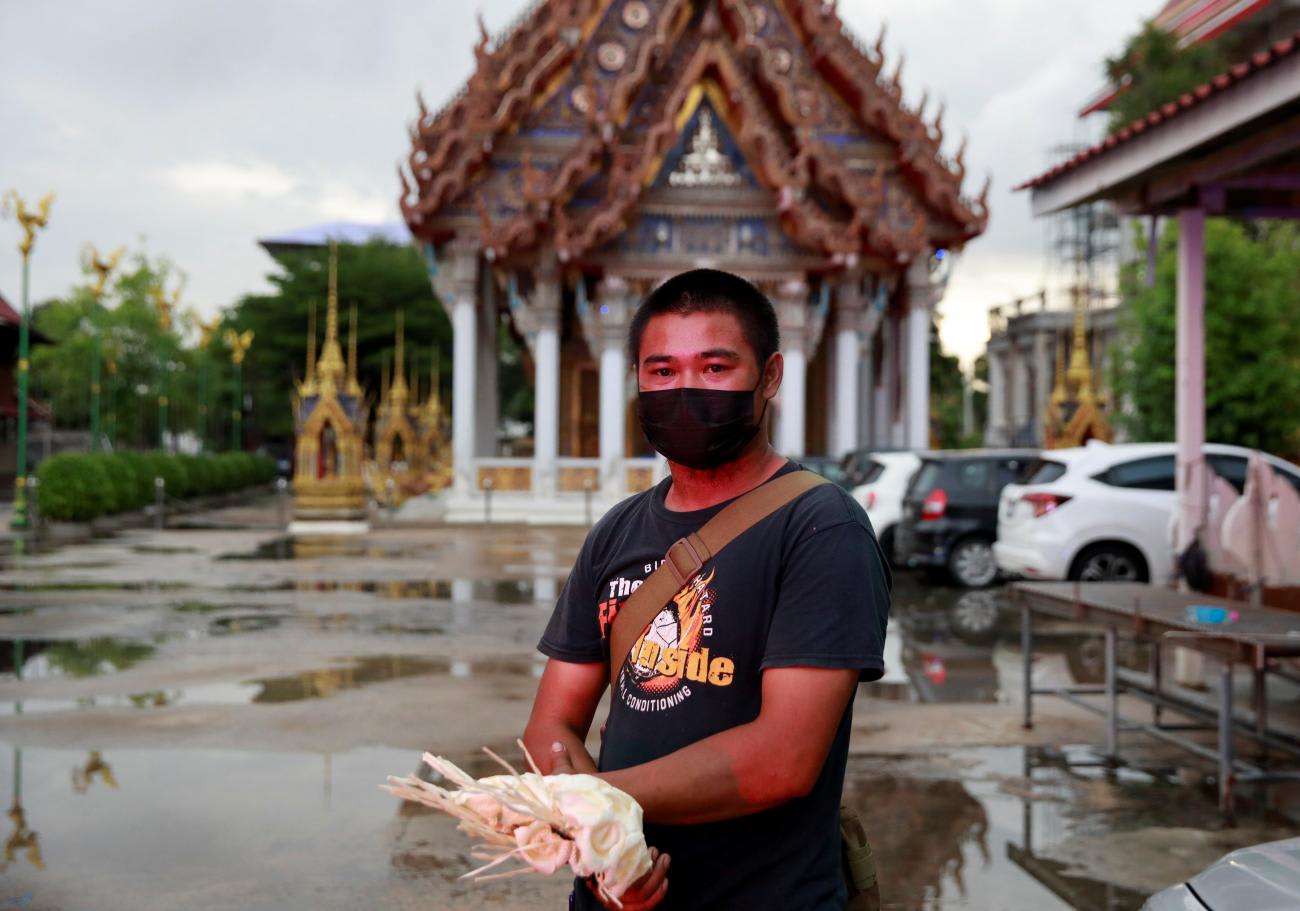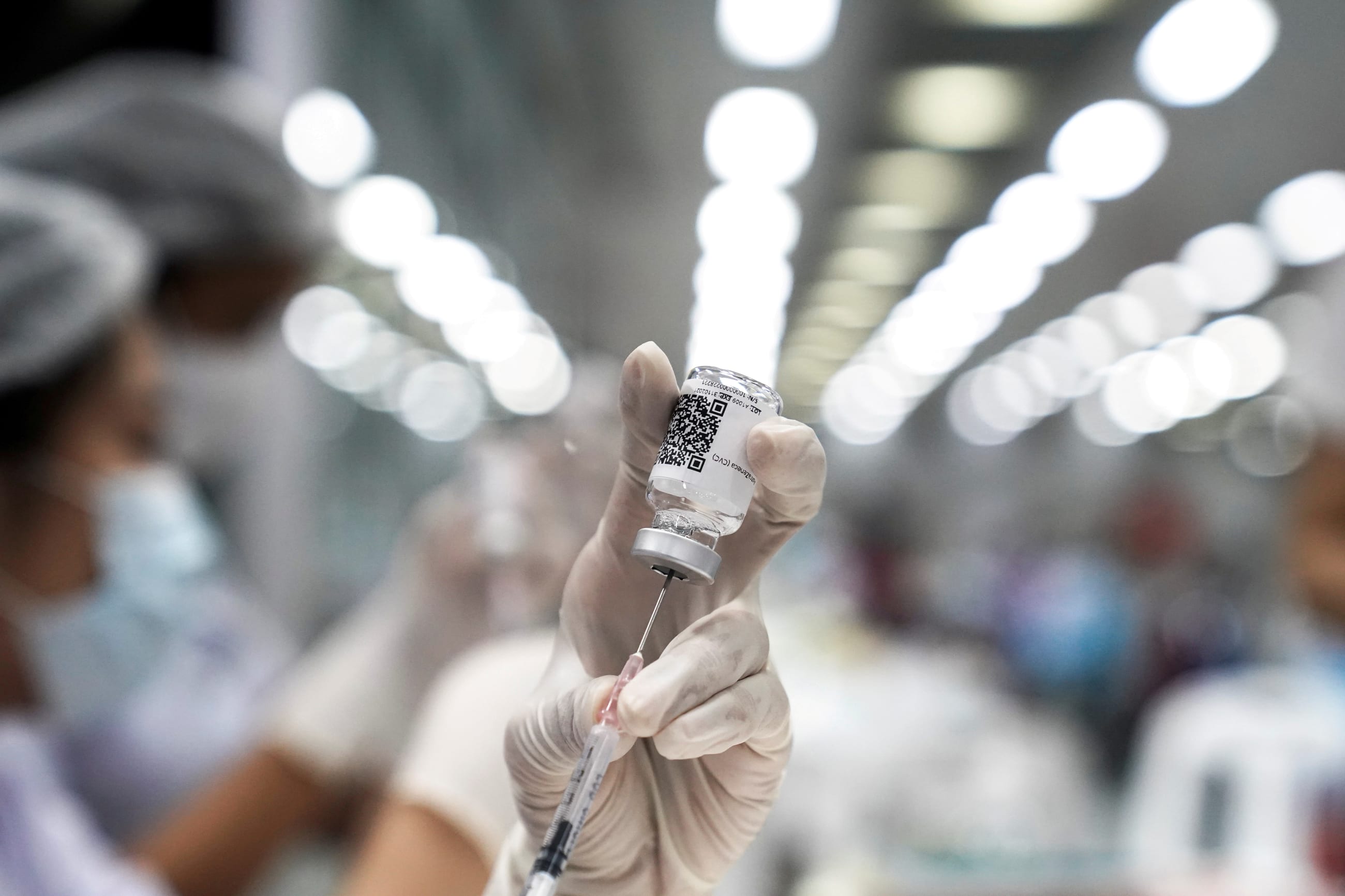The Promise of COVID-19 Vaccines
Vaccines have been instrumental in turning the tide in the global battle against COVID-19. In the short time since the first doses of the vaccine were made available, over a quarter of the world's population has received at least one dose. However, access to vaccines has been lopsided, with fewer than 2 percent of people living in low-and-middle income countries (LMICs) now vaccinated with at least one dose.
Early on, Thailand successfully managed to keep COVID cases low, but the arrival of the Delta variant thwarted attempts to control the virus
In light of new information on the gradual waning of antibodies against COVID-19 after vaccination, breakthrough infections, and the rise of variants (with many countries experiencing outbreaks due to the Delta variant), the looming question has been whether to offer a booster dose for COVID-19. These factors have forced policymakers in countries and global bodies to explore how to respond to emerging evidence and the implications it has for national vaccination programs as well as for the global effort to vaccinate populations, particularly those in low- and middle-income countries (LMICs).
Demands for a Booster in High- and Middle-Income Countries
Thailand was in the midst of making such a decision in July 2021. An upper middle-income country in Southeast Asia, Thailand is home to close to 70 million people. It provides affordable health services to its population through its three public health insurance schemes, building on a health system that has been nurtured over decades—part of its efforts to achieve Universal Health Coverage (UHC). The robust health system was critical in responding to the COVID-19 pandemic early on and Thailand had successfully managed to keep its caseload low. The arrival of the Delta variant in the country, however, thwarted attempts to control the number of COVID-19 cases, which increased this year. And with breakthrough cases among vaccinated health-care workers, there was cause for concern. This prompted the government to consider providing a booster dose of COVID-19.

Throughout the pandemic, the Thai Ministry of Public Health Intelligence Unit (MIU) has been reviewing evidence—drawing on current evidence as well as sourcing information through its networks—to form booster-related decisions. Based on a request from the MIU, the authors conducted a global review in mid-July 2021 of the practices and evidence available related to providing a third or booster dose. The review found that few countries had announced or were considering administering a third or booster dose of COVID-19 vaccine. At the time of the review, seven countries had announced providing a booster dose of the vaccine to specific high-risk groups and six other countries were considering this option for their populations.
Since then, high-income countries including Israel, Germany, and the United States, among others, have announced that they will provide booster shots, and they will start by administering the dose to specific groups, including immunocompromised persons. Thailand joined the ranks of these countries and announced a third dose of vaccines to health-care workers in July 2021; more recently, it stated that booster doses would be made available to the Thai public throughout September and October 2021. Other middle-income countries that have pursued a booster dose policy include the Dominican Republic, Indonesia, Turkey, Ecuador, and Cambodia.
After a Thai Ministry of Public Health Intelligence Unit request, the authors conducted a July 2021 review of the evidence related to booster doses
Limited Clinical Evidence to Inform Policy
Clinical evidence to support booster vaccine policy remains sparse. At the time of our July review, there were six studies on the efficacy of a third dose of COVID-19 vaccine of which only two had been completed. The two completed studies are focused on solid organ transplant recipients, in whom a third dose demonstrated promising results in terms of increasing the level of antibodies. There are three randomized controlled trials (RCTs) underway, as well; one non-randomized, open-label study; and two additional studies, one based on a case series, and another is a retrospective study. The Cov-Boost RCT in the UK is a large study, with close to 3,000 participants that will be tracked over the course of a year.
The clinical outcomes of these studies relate to immunogenicity—the level of antibodies as well as adverse events that occurred during the study. They do not assess outcomes such as mortality or hospitalization, which were used during clinical trials of the vaccines, making comparisons of efficacy levels difficult. Since then, more research has been conducted. A preprint of a study conducted in Israel suggests that boosters can reduce incidence and severity of the disease. However, other research has found a persistence in immunity from vaccines against COVID-19, countering the narrative of waning immunity.
National scientific bodies have also weighed in on the evidence. The Joint Committee on Vaccination and Immunisation (JCVI) in the UK noted the assumption that no harm was expected to emerge in making this recommendation. The U.S. Centers for Disease Control and Prevention (CDC) currently only recommends a booster dose in immunocompromised groups and more recently, the U.S. Food and Drug Administration (FDA) advisory panel recommended booster shots only for those above 65 years of age and high-risk groups. The European Centre for Disease Prevention and Control (ECDC) has found "no urgent need" for a booster dose though it considers provision for immunocompromised groups as a given. The emerging evidence on the need for a booster dose will need to be appraised further to balance clinical evidence and policy demands.

The Call for Booster Doses Challenges the Role of Vaccines
One of the key issues that has emerged in the discourse on booster doses is that of equity. Access to COVID-19 vaccines will have a profound impact on how the world will operate in the coming years. Vaccines are already having an impact, as seen in reduced numbers of severe symptoms, hospitalization and mortality. Vaccination certificates, such as the European Union's COVID Digital Certificate, are being used to ease travel restrictions that had been imposed to curtail the spread of COVID-19. Hence, expanding vaccine coverage is critical at this stage of the pandemic when many countries do not have enough vaccines to provide even the first dose to their populations.
The World Health Organization (WHO) called for a moratorium on boosters until at least the end of September 2021 so that 10 percent of the population in each country can receive at least one dose of vaccine. In August, it published an interim statement in which it concluded that based on current vaccine availability and continued immunity proffered by the primary course of vaccine, the focus should be on expanding vaccine coverage for the primary course around the world. Countries may be acting rationally in pursuing a booster dose policy to secure the health of their own populations, as they did when pursuing bilateral policies. Yet this type of policy will lead to a situation whereby a concentration in availability of vaccines in few countries may be seen as perpetuating inequities during a time of crisis, when resources are scarce. Limited vaccine supply is the key constraint in the current scenario, though this could change; the COVAX Facility is, for example, expanding its arsenal of vaccine supplies to LMICs, for whom it has secured about 1.5 billion doses by the end of 2021.
In addition to supply constraints in the short term, experience from middle-income countries suggests that there is a need to take multiple factors into account when considering or implementing booster-dose policies. The vaccination coverage, which may be one consideration in offering an additional dose, varies across countries planning to offer a booster dose. Further, countries may offer a booster dose on equity grounds to immunocompromised persons, for whom there appears to be evidence for the need of an additional dose, or healthcare workers, who face the most risk of contracting the disease. Governments and stakeholders in countries, including civil society organizations, must recognize, however, the limitation of the evidence available as well as the opportunity cost of this approach.
The current discourse on booster doses highlights the need for a different set of measures of success for COVID-19 vaccines in countries, particularly LMICs, and at the global level. Clinical study designs may need to account for the change in the types of outcomes desired such as prevention of breakthrough infections. The objectives of vaccination programs may need to be varied according to the population of interest. For example, the primary objective for vaccinating health-care and frontline workers may be to prevent breakthrough infections or transmission, whereas for the elderly or immunocompromised groups, it may be to reduce severe infections. Processes may need to be applied to identify priority groups for the booster dose and further research is needed on the interval between the standard regimen and booster dose. This can allow for a nuanced and realistic approach to tackling COVID-19 during a time when resources remain constrained.

Acknowledgments: The Health Intervention and Technology Assessment Program (HITAP) is a semi-autonomous research unit in the Ministry of Public Health, Thailand, that supports evidence-informed priority-setting and decision-making for healthcare. HITAP is funded by national and international public funding agencies. HITAP receives funding from the Health Systems Research Institute (HSRI) and the National Research Council of Thailand (NRCT). HITAP's international work is supported by the International Decision Support Initiative (iDSI), with the aim of providing technical assistance on health intervention and technology assessment to governments in low-income and middle-income countries. iDSI is funded by the Bill & Melinda Gates Foundation (OPP1202541), the UK's Department for International Development, and the Rockefeller Foundation.
Authors' note: HITAP is supporting the Thai Ministry of Public Health Intelligence Unit (MIU) to support timely review of evidence for making policy decisions on COVID-19. The findings, interpretations and conclusions expressed in this article do not necessarily reflect the views of the funding agencies.The authors have no competing interests to declare.












